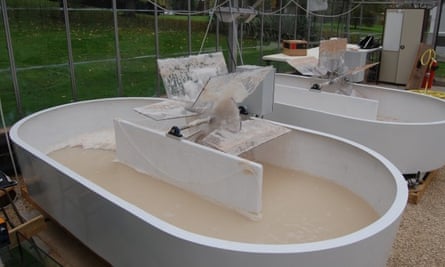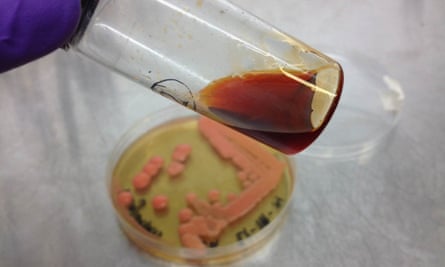The ubiquity of palm oil, which appears in everything from margarine to lipstick, is now widely recognised. So too are the detrimental effects of palm oil plantations on the world’s remaining rainforests. So why do we keep using it?
The simple answer is it’s just too good at what it does. Its versatility comes down to two main stellar properties: an exceptionally high melting point and very high saturation levels. Some vegetable oils get close to one of the two, but none to both.
Now researchers at the University of Bath believe they may have hit on an alternative: yeast. A three-year research programme between the university’s biochemistry and chemical engineering faculties has successfully cultivated an oily yeast that matches palm oil’s key properties almost identically.
Early laboratory tests in a shake flask show that the yeast Metschnikowia pulcherrima – historically known for its use in South Africa’s wine industry – can produce up to 20 grams per litre of oil, giving it a similar lipid profile to palm oil. Among its other selling points, M. pulcherrima can be found pretty much anywhere, including on a huge variety of tree leaves, fruits and flowers. Initial bio-prospecting efforts have turned up strains in Vietnam, South Africa, Italy, France – and fortuitously even on the University of Bath’s own campus.

Another singularity of M pulcherrima is its ability to grow on pretty much any organic feedstock. It’s hoped that waste from the process can feasibly be recycled as a feedstock as well, helping close the loop in the supply chain.
“Irrespective of what you are putting in at the start, whether it’s rapeseed, straw or waste food, M pulcherrima can use the sugars in it and grow on it”, says Dr Chris Chuck, research fellow at Bath’s Centre for Sustainable Chemical Technologies and co-lead on the project. Chuck estimates that the land use requirement for commercial yeast production could be 10 or even 100 times less than palm oil.
That will please those concerned about food security as well as the environment, because palm oil plantations are not only credited with widespread deforestation – their ubiquity in tropical regions is also blamed for occupying agricultural land and pushing up food prices as a result.
“Technologies which can produce useable oil from waste and so don’t compete for dedicated farmland look much more promising, and this work appears to bring one of those technologies closer to reality”, says Dr Doug Parr, chief scientist at Greenpeace UK.
From lab to plate
Such optimism doesn’t come without several notes of caution, however. For starters, yeast would not be the first palm oil alternative to have been tried and found wanting. Examples include oils based on algae or plants grown on marginal land, such as Jatropha curcas. Despite some niche applications, bringing these options to scale and matching palm oil’s lipid-capacity have proved steps too far to date.
“It’s still early days”, notes Parr, with respect to a yeast-based solution. “Commercialisation can reveal environmental and practical problems which were missed at the small scale.”
M pulcherrima’s researchers admit that the road is a long one from lab tests to industrial production. Unanswered questions include what the most sustainable and financially viable culture to produce the yeast on is, how to protect the yeast against bugs and other so-called inhibitors, and how to maintain high saturate levels.

The good news is that early tests in a one litre bioreactor provide a degree of confidence. Unlike other yeasts, M pulcherrima is found to be very tolerant to inhibitors. Initial research also shows it can grow at pH levels ranging from 1.9 to as high as nine. From an environmental perspective, experiments show that the yeast is able to grow at temperatures of between 12-30C, meaning energy inputs for heating and cooling can be kept low.
M pulcherrima can also use solubilised carbohydrate feedstock to ferment, meaning that the feed does not need to be broken down into sugars by additional enzymes. “Growing the enzymes is extremely expensive, so if we can replace that with a chemical process then that would be a big step”, says Chuck.
This raises the knotty question of whether yeast can ever compete with palm oil on cost. To be viable, the yeast process would ideally range between $800-$900 (£521-586) per tonne, says Chuck, citing recent palm oil trading values. To date, the closest comparable estimate is for yeasts cultured on dry plant matter, which researchers in China believe could produce oil at $1,200 per tonne (PDF). “There is a way to go yet”, conceded Chuck.
In coming months, the researchers at the University of Bath will begin scaling up their experiments. Tests of the innovative yeast-based process are next scheduled for bioreactors with a capacity of 30-50 litres, expanding to 10,000 litres by the end of this year.
If successful, it is hoped that the solution could be ready for commercial expansion in three to four years. The palm oil industry won’t realistically consider jumping ship just yet. That said, an undisclosed UK chemicals manufacturer is part-funding the research. If future experiments with M pulcherrima continue on their current trajectory, more funding will undoubtedly follow.
The palm oil debate is funded by the Roundtable on Sustainable Palm Oil. All content is editorially independent except for pieces labelled advertisement feature. Find out more here.
Join the community of sustainability professionals and experts. Become a GSB member to get more stories like this direct to your inbox.

Comments (…)
Sign in or create your Guardian account to join the discussion